|
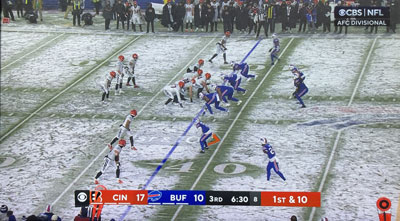 I restarted blogging after a two-year gap back in December, and so I had a two-year backlog of interesting stuff to share. (Suitably filtered for after-the-fact relevance :) I've done it in three tranches, recent history (pre Covid through mid-2020), ancient history (mid-2020 through mid-2021), and now this one, recent ancient history (some old stuff and then mid-2021 through end-2022). I can't explain the naming either. I restarted blogging after a two-year gap back in December, and so I had a two-year backlog of interesting stuff to share. (Suitably filtered for after-the-fact relevance :) I've done it in three tranches, recent history (pre Covid through mid-2020), ancient history (mid-2020 through mid-2021), and now this one, recent ancient history (some old stuff and then mid-2021 through end-2022). I can't explain the naming either.
This was done while watching football; today for example I watched the delightful slugfest between the Cincinnati Bengals and Buffalo Bills held in the snow of Buffalo. Playoff football as it should be. Yes of course my space heater is on :)
 Sept 2020: Belarus, once a startup magnet, faces a tech exodus. This has only become more true in the interim. I managed a team headquartered in Minsk; they were the greatest people as well as strong hardworking engineers. I feel for them, not only because of what has happened there, but the impact of the Russian invasion of Ukraine. Easy to forget that our problems are little one. Sept 2020: Belarus, once a startup magnet, faces a tech exodus. This has only become more true in the interim. I managed a team headquartered in Minsk; they were the greatest people as well as strong hardworking engineers. I feel for them, not only because of what has happened there, but the impact of the Russian invasion of Ukraine. Easy to forget that our problems are little one. 
 Sept 2020: Still a key issue: Tech's next big task: taking the office water cooler online. Now that it has become apparent that hybrid work is the new normal, the lack of informal communication remains a drawback. Sept 2020: Still a key issue: Tech's next big task: taking the office water cooler online. Now that it has become apparent that hybrid work is the new normal, the lack of informal communication remains a drawback. 
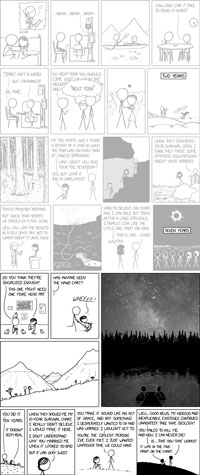 Nov 2020: xkcd: Ten Years. My favorite of all time, amid heavy competition. I know you can't read it here; please click through and enjoy. Nov 2020: xkcd: Ten Years. My favorite of all time, amid heavy competition. I know you can't read it here; please click through and enjoy. 
Dec 2020: Tim Carmody: Long Overdue. "It’s been a long time. So, first I'll ask: are you well? What’s changed for you since I last wrote? And the last is the most unusual one, although maybe it should not be so unusual from now on: Have you lost anyone?" Wow. Please read and reflect. 
Aug 2021: news you should use: How to properly cut and serve different cheeses. I'm available if you'd like to practice :) 
 Sep 2021: Maximally interesting: the 100 most spoken languages. Another must-click-through. What do you think is #1? Where do you think English ranks? Sep 2021: Maximally interesting: the 100 most spoken languages. Another must-click-through. What do you think is #1? Where do you think English ranks? 
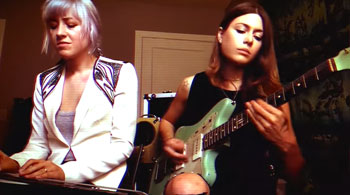 Oct 2021: the Larkin Poe cover of Dazed and Confused. I promise this will have you from the first note. Oct 2021: the Larkin Poe cover of Dazed and Confused. I promise this will have you from the first note. 
Oct 2021: Chris Dixon links Hack Butcher: Composability is to software, as compounding interest is to finance. I thought it was an interesting analogy so I saved it, but now too it's interesting also because Chris Dixon joined VC firm A16Z and has been among the most vociferous supporters of crypto and "Web3". I love reading his over-the-top defenses and withering rebukes to critics. All in the schadenfreude file. 
Jan 2022: Molly White: "Blockchain-based systems are not what they say they are". Correct. Chris, meet Molly. 
Nov 2022: Tim Bray: AWS and Blockchain. "I'm not prepared to say that no blockchain-based system will ever be useful for anything. But I’m gonna stay negative until I see one actually at work doing something useful, without number-go-up greedheads clamped on its teats." 
 Dec 2021: Maggie's Farm considers SAT tests, which links You Aren't Actually Mad at the SATs. A proxy for the whole academic system of testing, grading, exams, etc. It will be most interesting to see whether the pendulum swings back on all this. Let's hope so. Dec 2021: Maggie's Farm considers SAT tests, which links You Aren't Actually Mad at the SATs. A proxy for the whole academic system of testing, grading, exams, etc. It will be most interesting to see whether the pendulum swings back on all this. Let's hope so. 
Jan 2022: Making the web better, with blocks! I have mad respect for Joel Spolsky and saved this thinking he was on to something, but a year later, nada. Software composability is as difficult to find as compound interest :) 
Feb 2022: Tim Bray: Google Memory loss. It's a true thing. And evidence increasingly seems to indicate it's a selective memory loss. 
Mar 2022: Dave Winer ponders Evolution in Software. "The general rule is this, you can't go back in time and redo a decision. What's done is done." 
When we discover intelligent life on another planet, the will have computers; CPUs, memory, etc. They will not have Unix.
 Mar 2022: I kept this because it's interesting, and especially for my friend Daniel Jacoby: Ernest Shackleton’s Ship Found After 106 Years. The underwater footage is amazing! Mar 2022: I kept this because it's interesting, and especially for my friend Daniel Jacoby: Ernest Shackleton’s Ship Found After 106 Years. The underwater footage is amazing! 
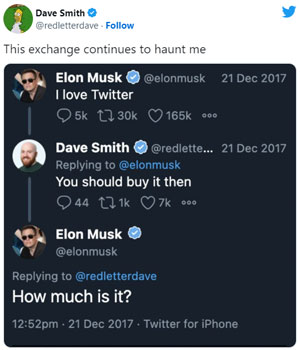 Apr 2022: Dave Smith: This exchange continues to haunt me. Speaking for millions of people: "Thanks Dave"! Apr 2022: Dave Smith: This exchange continues to haunt me. Speaking for millions of people: "Thanks Dave"! 
Oct 2022: new Elon Musk essay (in China Cyberspace magazine):Believing in technology for a better future. "As technology accelerates, it may one day surpass human understanding and control. Some are optimistic and some are pessimistic. But I believe that as long as we are not complacent and always maintain a sense of urgency, the future of humanity will be bright, driven by the power of technology." 
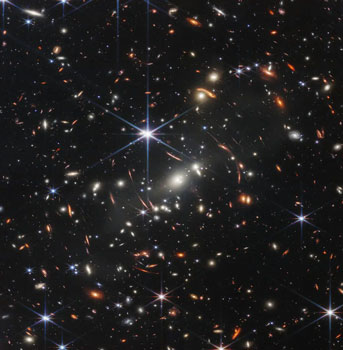 Jul 2022: The first astonishing image from the James Webb Telescope. "It is the deepest image of our universe that has ever been taken." Wow. Many more to follow! Jul 2022: The first astonishing image from the James Webb Telescope. "It is the deepest image of our universe that has ever been taken." Wow. Many more to follow! 
Dec 2022: NASA: 50 years ago: Apollo 17. "Not long after midnight on Dec. 7, 1972, the last crewed mission to the Moon, Apollo 17, lifted off with three astronauts: Eugene Cernan, Harrison Schmitt, and Ronald Evans." 50 years ago. Wow. 
 Dec 2022: Boing Boing: Age-of-sail style map of the Mendelbrot Set. Beautiful! As is the set itself; it continues to be an infinite source of awe. Dec 2022: Boing Boing: Age-of-sail style map of the Mendelbrot Set. Beautiful! As is the set itself; it continues to be an infinite source of awe. 
And we're up to date! Yay. And Onward... 
| 



